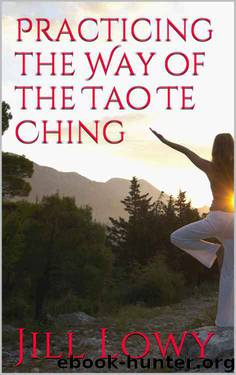Practicing the Way of the Tao Te Ching by Jill Lowy

Author:Jill Lowy [Lowy, Jill]
Language: eng
Format: epub
Publisher: Jill Lowy
Published: 2015-02-25T23:00:00+00:00
THIRTY-THREE
Knowing others is wisdom;
Knowing the self is enlightenment.
Mastering others requires force;
Mastering the self needs strength.
He who knows he has enough is rich.
Perseverance is a sign of will power.
He who stays where he is endures.
To die, but not to perish is to be eternally present.
The Greek aphorism “Know Thyself” was inscribed at the forecourt in the Temple of Apollo at Delphi. Knowing the Self is the gateway to enlightenment and realization. Ralph Waldo Emerson wrote a poem entitled “Gnothi Seauton”, which illustrates the belief that God exists within everyone and by deeply knowing oneself, you can know God. This is similar to the Taoist understanding of the microcosm and the macrocosm, and the Hermetic axiom, “As above, so below.” This can be a difficult concept to understand, but basically the universe is a totality and it is manifested in its totality within everything else. We are in the Tao and the Tao is in us. So by deeply knowing ourselves, we can know the Tao. We can see an illustration of this phenomenon through the nature of the hologram. A hologram is basically a three dimensional image made with the use of a laser. The interesting thing about a holographic image is it includes information about light scattered from every point of the picture. In other words, every piece of the holographic image contains the whole image. If you take a holographic image and cut it into half, the entire scene can still be seen in each piece. And if you cut those pieces in half, the entire scene can be seen in each new piece. This is a concrete analogy of the macrocosm being reflected in the microcosm, or the Universe being reflected as a totality in each living being. All the answers to our questions regarding the cosmos and who we are exist within us.
“To die, but not to perish is to be eternally present.” How can one die and yet not perish? How can one be eternally present? According to the sage, one is eternally present when one is centered in the Tao. When one is centered in the Tao, one may die, but does not perish. Birth and death are natural occurrences in the world. Everything and everybody goes through them. And it is happening all the time from atoms to galaxies. It is interesting the cells in our own bodies are continually dying and regenerating every day. So birth and death are just part of the natural processes of life. There are also many levels of birth and death in the universe. We experience birth and death of thoughts, which are constantly coming and going through our minds. We may experience the birth of a variety of emotions within us that can make us feel good or bad. We give birth to creative ideas, arts, crafts, goods and services to the world. And all of these pass away in time. We (our bodies) also pass away in time. But our essential self does not. It does not perish.
Download
This site does not store any files on its server. We only index and link to content provided by other sites. Please contact the content providers to delete copyright contents if any and email us, we'll remove relevant links or contents immediately.
| Confucianism | Feng Shui |
| I Ching | Jainism |
| Karma | Shintoism |
| Sikhism | Tao Te Ching |
| Taoism | Tibetan Book of the Dead |
| Zoroastrianism |
The Tao of Physics by Fritjof Capra(2276)
Human Design by Chetan Parkyn(2075)
The Diamond Cutter by Geshe Michael Roach(2062)
Feng Shui by Stephen Skinner(1941)
The Alchemy of Sexual Energy by Mantak Chia(1860)
Tao Te Ching by Lao Tzu(1843)
365 Tao: Daily Meditations by Ming-Dao Deng(1623)
Tao Tantric Arts for Women by Minke de Vos(1600)
Sun Tzu's The Art of War by Giles Lionel Minford John Tzu Sun(1542)
Sidney Sheldon (1982) Master Of The Game by Sidney Sheldon(1520)
Buddhism 101 by Arnie Kozak(1514)
Karma-Yoga and Bhakti-Yoga by Swami Vivekananda(1496)
The Analects of Confucius by Burton Watson(1436)
The Art of War Other Classics of Eastern Philosophy by Sun Tzu Lao-Tzu Confucius Mencius(1428)
Tao te ching by Lao Tzu(1367)
The Way of Chuang Tzu by Thomas Merton(1365)
The New Bohemians Handbook by Justina Blakeney(1356)
The Sayings Of by Confucius(1317)
Bless This House by Donna Henes(1272)
